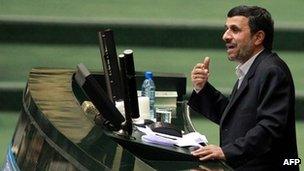Iran parliament summons President Mahmoud Ahmadinejad
- Published

Mahmoud Ahmadinejad could wait until after the 2 March elections to appear before MPs
Iran's parliament has summoned the president for questioning for the first time since the 1979 Islamic Revolution.
Mahmoud Ahmadinejad faces a long list of questions about the state of the economy, as well as his foreign and domestic policy decisions.
MPs have threatened similar action before, but failed to follow through.
The summons will be sent to Mr Ahmadinejad in the next two days. He must appear in parliament within a month according to Iran's constitution.
That means he could appear after legislative elections on 2 March - the first national elections since the disputed presidential poll in 2009.
Power struggle
Seventy-nine members of the 290-member Majlis voted on Tuesday to summon Mahmoud Ahmadinejad.
"There is a requirement for the president to answer questions in an open session of the parliament," said Deputy Speaker Mohammad Reza Bahonar in a speech broadcast on state radio.
The Fars news agency published a list of 10 questions which it said MPs would put to the president.
Although they focus on the economy - seeking explanations for perceived failures to enact legislation, tackle unemployment and pay subsidies - some delve into the rift between Mr Ahmadinejad and Iran's Supreme Leader, Ayatollah Ali Khamenei, which has been widening for some time.
"What justification is there to your 11-day resistance against the verdict issued by the Revolution's leader [Ayatollah Khamenei] to reinstate Hojjat ol-Eslam [Heidar] Moslehi, the respected intelligence minister?" one asks.
Last April, Mr Ahmadinejad decided to sack Mr Moslehi, reportedly after the minister had dismissed an official with close ties to the president's chief of staff and close confidante, Esfandiar Rahim-Mashaei.
But Ayatollah Khamenei decided to overrule him and ordered the reinstatement of Mr Moslehi. The decision is said to have so enraged Mr Ahmadinejad that he stayed away from government meetings for 11 days.
Another question concerns his decision to dismiss former Foreign Minister Manouchehr Mottaki while he was visiting Senegal.
The president will also be asked about why his administration failed to promote the Islamic dress code that calls for women to wear the traditional veil, and to explain his ties to Mr Rahim-Mashaei, whose daughter is married to the president's son.
It is unclear what would happen under the constitution if Mr Ahmadinejad failed to appear before parliament.
- Published8 July 2011
- Published7 May 2011
- Published4 August 2010
- Published1 May 2011